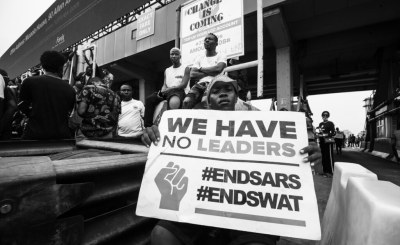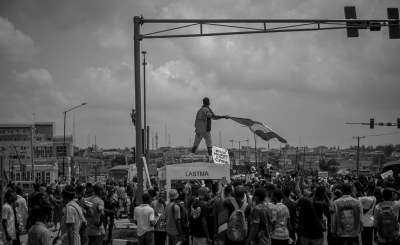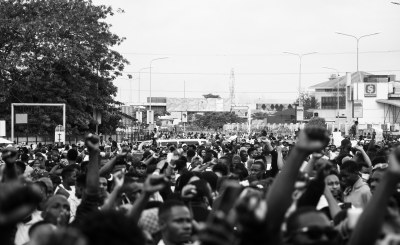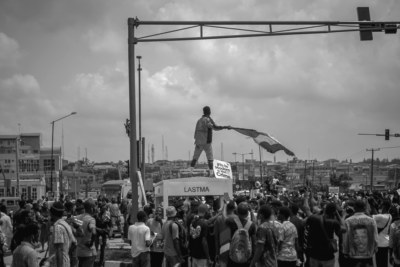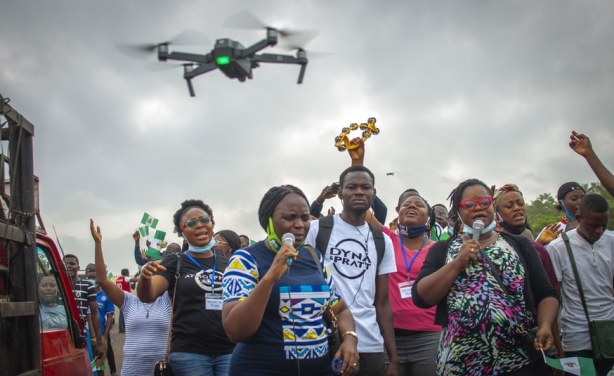-
Nigeria: Protesters Against Police Brutality Demand Justice a Year Later
VOA, 21 October 2021
Activists in Nigeria gathered this week to mark the anniversary of last year's massive street rallies against police brutality. Many victims of police abuse say they have yet to… Read more »
-
Nigeria: The #EndSARS Panels One Year On - Was Justice Ever Delivered?
African Arguments, 20 October 2021
Or has it been deferred? Read more »
-
Nigeria: One Year Since #EndSARS Protests, No Justice for Victims of Police Brutality
AI London, 20 October 2021
One year after peaceful #EndSARS protests ended in a brutal crackdown by the Nigerian security forces in Abuja, Lagos and other parts of Nigeria, not a single member of the police… Read more »
-
Premium Times, 20 October 2021
Today marks one year after soldiers brutally shot at peaceful protesters at Lekki Tollgate in Lagos in a desperate bid to quell the #EndSARS protest. Read more »
-
Nigeria: One Year After, What Has Happened to Protesters' Five-Point Demand?
Premium Times, 20 October 2021
The #EndSARS protesters put forward a five-point demand during the historic demonstrations last year. How much of the demands have been met one year after? Read more »
-
Nigeria: Nigeria - a Year On, No Justice for #EndSARS Crackdown
HRW, 19 October 2021
The victims are still awaiting justice a year after security forces violently suppressed protests calling for an end to police brutality in Nigeria, Human Rights Watch said today.… Read more »
-
Nigeria: Few Promises of Reform Have Been Kept a Year After #EndSARS Protests
The Conversation Africa, 18 October 2021
Police brutality is not unique to Nigeria. The menace is almost universal. It is the level of accountability and transparency in policing that makes the difference in some… Read more »
-
Nigeria: October 20 - the #EndSARS Memorial
Premium Times, 19 October 2021
The Police should not re-open old wounds by intimidating, harassing and molesting anyone who chooses to remember, commemorate or talk about October 20, 2020. It is the duty of the… Read more »
-
Nigeria: Unease As Nigeria Marks One Year After #EndSARS Protests
DW, 16 October 2021
One year after #EndSARS protests rocked Nigeria, police have warned against a repeat to mark the anniversary. The largest protest in Nigeria's history ended after the army… Read more »
-
Nigeria: #ENDSARS - Osinbajo, Govs Beg Youths to Halt Commemorative Protests
This Day, 16 October 2021
*Promise compensation for victims, prosecution of indicted persons Read more »
One Year On, No Justice for #EndSARS Crackdown Victims in Nigeria
One year after #EndSARS protests rocked Nigeria, police have warned against a repeat to mark the anniversary. The largest protest in Nigeria's history ended after the army reportedly killed at least 12 demonstrators.
Empty burnt-down buildings in Nigeria's commercial capital Lagos are all that remains of the #EndSARS movement - a largely youth-driven protest movement - that shook Nigeria's ruling class to its core in October 2020, writes Chrispin Mwakideu for Deutsche Welle. As a precaution to avoid a repeat, Nigerian police issued a warning to thwart any potential fresh protests.
Tens of thousands of people took to the streets demanding that President Muhammadu Buhari carry out police reforms. Barely one month before the protests started, Buhari had signed into law the Police Act 2020, which provides a framework to kick-start genuine and far-reaching police reforms.
The Nigerian police created the infamous Special Anti-Robbery Squad (SARS) in 1992 to tackle rising carjackings, kidnappings, cattle rustling and illegal firearms, among other crimes. As time passed, SARS officers were accused of numerous abuses, including torture, rape, extortion, forced disappearances and extrajudicial killings.
InFocus
-
A year after Nigerian youths went to the streets to protest against police brutality, among other challenges facing the country, a non-governmental organisation, SING Nigeria, ... Read more »
